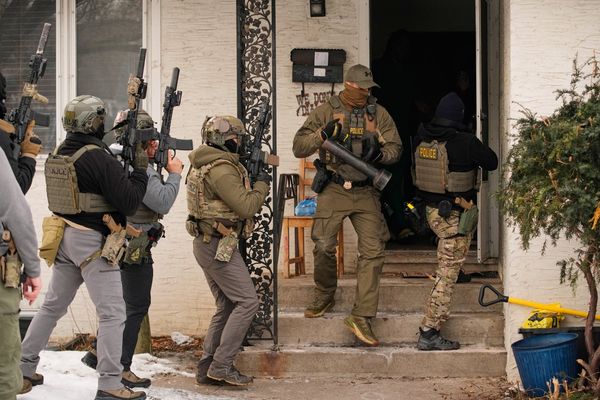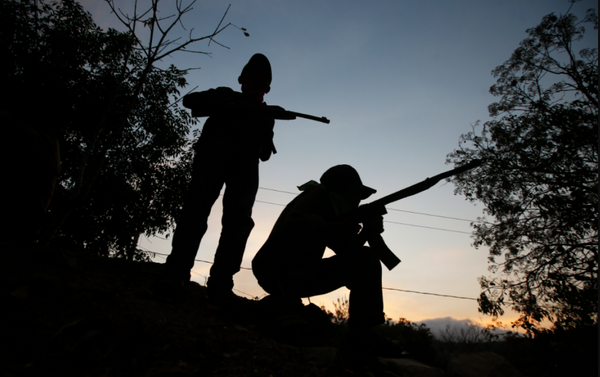
In an age in which mega-clubs owned by sheikhs or oligarchs dominate world football, the East German Oberliga – which operated behind the iron curtain – certainly sounds appealing. It was a league with no billionaire owners, agents or transfer fees, in which footballers and coaches were employed by the state and clubs had honest names like Lokomotive Leipzig, Turbine Weimar or Motor Suhl.
But Stasi FC, a terrifying new Sky documentary, serves as a reminder that real socialism was just as capable of building crushing monopolies as turbo-capitalism. East Berlin super-club BFC Dynamo may have won the German Democratic Republic’s championship for a record-breaking 10 years on the trot, but it did so by being a bullying behemoth that makes teams like Manchester City or Paris Saint-Germain look like well-meaning grassroots initiatives, and the terraces of Millwall FC like a haven of political correctness. It used the secret police to spy on its own players, and brutally retaliated against footballers who made the switch to West German football – potentially going so far as to assassinate them.
On the surface, East German football expounded equality and solidarity for all men. Players were regularly reminded of their duty as “ambassadors in tracksuits” for the glories of the socialist system, and at BFC Dynamo, party functionaries gave the squad weekly coaching sessions on the correct way of interpreting world events.

But when the boss of one of the clubs in your league is also the head of the authoritarian state’s secret police, socialist football is not exactly equal.
“It was an open secret that Dynamo Berlin was the pet project of Erich Mielke, the head of the Stasi, and that he held a protecting hand over the club”, remembers Ralf Minge, a former striker for BFC’s biggest competitor, Dynamo Dresden. “This meant that they became every other team’s No 1 rival. When you played them, you wanted to win.”
Mielke, a red-hot communist who built up the largest secret police apparatus in the world per capita, was not only BFC’s biggest fan but the club’s honorary president. When he decided in the 60s that East Berlin needed not just to concentrate political power but hoard trophies, he did not need a lavish transfer budget to make it happen. He simply bent the system to his will.
The East German capital’s hitherto most successful team, army club ASK Vorwärts Berlin, was uprooted and moved to Frankfurt an der Oder, leaving the spoils of the largest city’s youth to Mielke. Promising footballers from smaller clubs were not courted but commanded. “If there was a player Mielke wanted, the lad was told: ‘after the summer you’re going to play for BFC, and if you don’t, that’s the end of competitive sport for you’,” says Falko Götz, who played for Dynamo from 1971 until 1983. “It didn’t matter what your contract said.”
Fearing the heavy hand of the Stasi on their shoulders, referees reliably blew their whistles in Dynamo’s favour. In a crucial match in 1986, opponent Lokomotive Leipzig’s captain was sent off for a trivial offence and the referee kept the match going until he could hand the Mielke club a penalty in the 95th minute. “To be honest, I was embarrassed by what was going on on the pitch sometimes,” says Götz. “No one wanted to win that way.”

Its supporters began to internalise the negative vibes from other teams: ironically, the club that was supposed to show the superiority of socialism ended up as the team of choice for East Berlin’s neo-Nazi hooligans. Fans sang paeans to Mielke and came up with their own version of “No one likes us, we don’t care”: “Grandpa was in the SS, Dad was in the Stasi, and I’m with BFC”.
Not all of the club’s success was down to intimidation or dodgy refereeing. “BFC Dynamo undoubtedly had a top team,” says Minge. The youth centres from which it drew most of its players were more advanced than those in the west. “The little international recognition East Germany got was via sport,” says Götz. “So when it came to training young athletes, they went all in.”
The footballers that rose through East German academies were two-footed, tactically aware and athletic. “Our training was quite broad: once a week it’d be gymnastics for an hour, and everyone could do a handstand on the parallel bars,” says Minge. After German reunification, when some West German players joined, he realised that “some of them couldn’t even do pull-ups!”. It was even more frustrating, then, for Mielke to watch his hobbyhorse repeatedly fail on the world stage. “I had teammates who’d played 50 internationals for the DDR by the time they were 23 but had only notched up eight European Cup games, because we never got past the first round,” says Götz. “We won domestic titles, but internationally we were an absolute catastrophe.”

Minge argues that the militaristic approach to sport, which enabled East Germany to outperform its much larger western neighbours at the Olympic Games, became a hindrance on the pitch. “We had a mentality deficit,” he says. “We were like army units, adhering to strict rules that were passed down from above. That didn’t exactly help you to make the best of your own qualities.”
The lack of international success frustrated not just the socialist regime but also players such as Götz. “By the time I turned 20 I’d won the championship three times, but I was missing perspective,” he says. “For me there was only West German football, where as a player you were responsible for your own achievements.”
But for players from the Stasi’s own prestige project to jump ship for the west would have been a huge loss of face – something the secret police was all too aware of. In 1979, midfielder Lutz Eigendorf, one of BFC’s star players and a personal favourite of Mielke’s, escaped his minders on a tour to West Germany and sought asylum.
The Ministry for State Security retaliated furiously: unbeknown to western intelligence, as many as 50 Stasi informants tracked Eigendorf’s every movement after he began to ply his trade in the West German Bundesliga. Stasi FC tells the story of how the secret police arrested three Dynamo Dresden players in a sting operation in 1981 to send a message to other potential wantaways, imprisoning them for 11 months for Republikflucht, “deserting the republic”.
Eigendorf died in a car crash two years later, and though the Stasi’s involvement has never been proven, it had a chilling effect on many players. “I can’t say what really happened, because there’s a lot of room for speculation,” says Götz. “But there’s no question that the Stasi was capable of it.” In 1983, he and his teammate Dirk Schlegel took the leap anyway, jumping into a cab during a shopping trip ahead of an away match in Belgrade that took them to the West German embassy.
BFC Dynamo continued to win, notching up its 10th straight championship title in 1988. But when the Berlin Wall fell in 1989, the club collapsed: 22 players, two starting 11s, left for the west that same season. After filing for bankruptcy in 2001, the club managed to consolidate its finances and now plays in the fourth division of German football. Its fans are still best avoided.

The extent to which footballers had entered a Faustian pact by playing for the secret police’s own team only dawned on many of them later. When the Stasi archives were opened to the public in 1992, Götz asked to take a look at his file. He spent four straight days in the reading room in Berlin, subsequently breaking off relationships with some close friends who had spied on him and his family. “Those weren’t happy days,” he says. “You descend into these depths of humanity that you didn’t think were possible.”
One pattern was hard to ignore, he says. The players or coaches who spied on him “were usually those who would have struggled to remain in professional football on the basis of talent alone.”
• This article was amended on 27 November 2023. An editing error led to Frankfurt an der Oder being referred to as “Frankfurt and Oder” in an earlier version.
Stasi FC is on Sunday 26 November at 9pm on Sky Documentaries







